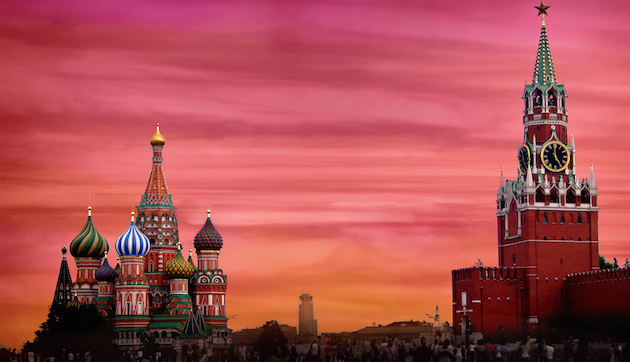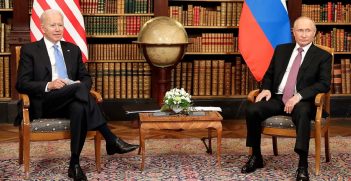Beware Cold Warriors

Thirty years since the end of the Cold War, tensions between Russia and the West are running high against the background of Syria, Ukraine and allegations of cyber attack. It more important than ever to continue questioning so-called received wisdom.
In popular and scholarly commentary, the continuities with the Cold War outweigh the contrasts in the ways we characterise today’s Russian Federation. During the Soviet years, there was a militant embrace in the West of the commonplaces demonstrating that the communist government was malevolent, mendacious and fanatical in its inhumane, anti-liberal worldview. For today’s Cold Warriors, such commonplaces continue to characterise Putin’s governance, an attitude that is evident in their relentless vilification of the president himself, among other things. As the US scholar, Keith Gessen puts it: “At no time in history have more people with less knowledge and greater outrage opined on the subject of Russia’s president.” Gessen’s pointed opinion suggests that blaming Russian for America’s bizarre election to the presidency of an ignorant, incompetent, narcissistic, sexist liar could well be evidence of US intellectual and moral bankruptcy.
Like many of their forerunners, the anti-Russian ideological rigidity of contemporary Cold Warriors is most often anchored in traditional realist doctrines of international relations. Their central focus is on the geopolitics of an escalating new Cold War, which means the continual matching of Russia’s military modernisation against the West’s capabilities, a reassertion of the spectre of nuclear warfare and multi-billion dollar defence budgets to combat domestic vulnerabilities to an unwinnable cyber war. As always, the first casualty of rising tensions between the West and Russia is the accuracy of the so-called received wisdom.
Which bring us the issue of justifying what we think we know about today’s Russia and how do we know that we know it? In this context, it’s interesting to revisit the work of one of the most famous British historians of the Soviet Union, Edward Hallet Carr. Especially in his two most influential books on historiography, What is History and The Twenty Years Crisis, 1919 to 1939, Carr was trenchantly critical of what he saw as extravagant interpretation riding roughshod over the facts in Soviet studies.
Carr and Russia
Central to Carr’s list of omissions in any fitting understanding of Russian affairs was the Marxist concept of political economy: that is, the complex interrelationships of economics, foreign and domestic policymaking, and the national interests and diverse social and cultural contexts of the West’s wealthy and powerful. For this reason alone, his books are fascinating, replete with what has been called “the vices of integrity”. Mostly, that refers to Carr’s monk-like dedication to precise scholarship. The story is that he was at his desk all day and into the night surrounded by books, journals, newspaper clippings, transcripts of parliamentary debates, speeches and interviews with world leaders and opinion makers and reports of conferences and high level meetings. There was more singular archival material, especially from the Soviet Union, for example, on land legislation, agricultural and industrial production, the changing structures of governance or the composition of the bureaucracy during the Stalinist era. As the Anglo-Russian philosopher Isaiah Berlin put it: “Carr did not believe you can read the palm of history’s hand by way of ephemeral Kremlinology and collect your shilling.” Carr’s purpose may best be characterised as an admirable commitment to achieving the best obtainable version of events.
Carr also believed his approach carried the hope of the kind of informed commentary that could counter the precarious state of affairs between East and West fostered by mutual ignorance. In common with other aspects of Carr’s writing, such Cold War perspectives appear to apply equally to the post-Soviet period. For example, they are reflected in the opinions of the long-term Russia watcher, Henry Kissinger, who is generally regarded as more the cool-headed strategic realist than the bleeding heart in matters of US foreign policy:
Putin is a serious strategist—on the premises of Russian history. Understanding US values and psychology are not his strong suit. Nor has understanding Russian history and psychology been a strong suit of American policy-makers….
Russia, Syria, and a contemporary proxy war
Still, whatever its limitations, Carr’s legacy has been a set of useful guidelines for writing about the post-Soviet era. Consider, for example, the claims and counterclaims surrounding the use of sarin gas on 21 August 2013 against the civilian population in eastern and western Ghouta on the outskirts of Damascus. It brought the Obama administration to the brink of bombing the daylights out of the Assad regime—despite its culpability being repeatedly denied by the Russian government.
For more than a month, all day into the weekend, I systematically compiled an indexed, annotated folder of all the information I could find about or related to the attack. This included the media coverage, mostly from the upmarket US and European outlets, eyewitness accounts, social media photos, the Kremlin’s official response, the reports of the UN investigative team, Human Rights Watch, the Stockholm International Peace Research Institute, the American Veterans Intelligence Professionals for Sanity, the Syrian Solidarity Group, the Vatican, and the US Senate Intelligence Committee, as well as the scientific commentary on the chemical composition, manufacture and use of sarin, the type of rockets alleged to have delivered it to Ghouta, whether they could carry toxic chemicals, plus the calculations of their reverse trajectories, and the role of Britain’s Porton Downs laboratories in identifying whether the sarin allegedly used could be sourced to Assad’s arsenals.
The result was a labyrinthine narrative, loaded with unsubstantiated and circumstantial conclusions, and the toxic practice of news aggregation: that is, the uncritical repetition of opinion across disparate media. Then a year after the sarin attacks the American investigative journalist, Seymour Hersh, published an article based, not so much on leaks, as on a flood of information from anonymous intelligence operatives in the US, the UK and across the Middle East. Together with my overflowing folder, this pointed towards a conclusion that vindicated the Russian stance—in other words the prevailing assumption of the Assad government’s responsibility was highly questionable, if not plainly mistaken.
What might Carr have made of such a conclusion? Certainly he would not have been surprised by the alternative interpretation that the sarin attack was a false flag operation in which some in the Western intelligence community appear to have played a duplicitous and morally repulsive role. In the thrust and parry of international politics, he said, ‘‘Power goes far to create the morality convenient to itself.’
Nor would he have been surprised that, as with the Cold War, the narrowness, blindness and stupidity (his words) exemplified by America’s post-Trump proclamations might cripple the possibility of détente any time soon between Russia and the West. This includes the recent statement by US Secretary of Defense General James ‘Mad Dog’ Mattis that Vladimir Putin is trying to “break the Northern Atlantic alliance” and “the US should take steps to defend itself”. Aside from the perennial challenge of distinguishing defensive from offensive militarism by both sides, notably Putin’s response was that a ‘hot’ war with the US would amount to committing global suicide. No one would survive it, he said.
It’s been well documented that both the Russian and the American governments have consistently laid claim to the moral high ground in response to accusations of warmongering and cyber attacks. For Carr, such Cold War-style militancy, now typified by General Mattis’ views, indicates that realism in international affairs clearly has its limits. It is, and should be, constrained by the atavistic, utopian human desire to reach beyond the mere assertion of national power, whose victories are short-lived and murderously costly. Still, he warns “The characteristic vice of the utopian is naivety; of the realist sterility.” Here, Carr’s usage of the term “utopian” is synonymous with “moral idealism” so that the aim of his theorising about international relations is to strive for a balance between aspirations and practicalities. As he acknowledged, to that very great extent he always remained touched by the belief in progress and the moral utopianism of his 19th century liberal forebears.
Dr Dorothy Horsfield is a visiting fellow at the ANU College of Arts and Social Sciences. She specialises in Russian, Central European, East European and Eurasian studies and recently gave a talk at AIIA ACT Branch to promote her recently published book ‘Russia in Wake of the Cold War: Perceptions & Prejudices’.
This article is published under a Creative Commons Licence and may be republished with attribution.





